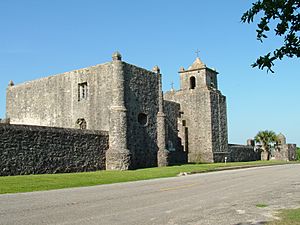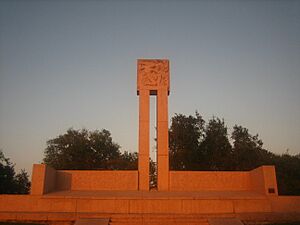Goliad Campaign facts for kids
Quick facts for kids Goliad Campaign |
|||||||
|---|---|---|---|---|---|---|---|
| Part of the Texas Revolution | |||||||
 Fort Defiance in Goliad, Texas |
|||||||
|
|||||||
| Belligerents | |||||||
| Texian Rebels; later the Republic of Texas | |||||||
| Commanders and leaders | |||||||
| José de Urrea | Frank Johnson James Grant † James Fannin † Amon B. King † William Ward † |
||||||
| Strength | |||||||
| 1,500 regulars, militia, and cavalry | 500 9 cannons |
||||||
| Casualties and losses | |||||||
| est. 20 killed, est. 350 injured or missing | 472 KIA, executed, or imprisoned 9 cannons captured 28 captured but escaped |
||||||
The Goliad Campaign was a major military action in 1836. It was part of the Texas Revolution. The Mexican army tried to take back the Texas Gulf Coast. General José de Urrea led the Mexican troops. They fought against settlers in Texas, called Texians. These battles happened in February and March of that year.
Contents
Why the Fight Started
In 1835, Mexico changed its government. It became a centralized government. This meant the main government in Mexico City had more power. Before, states had more power (this was called federalism). Many people did not like this change. They decided to fight.
Settlers in Texas were mostly from the United States. They revolted in October 1835. By the end of that year, they had pushed all Mexican soldiers out of Texas. For a short time, there was no fighting.
Two Texian leaders, Frank W. Johnson and James Grant, gathered volunteers. They planned to invade a Mexican port city called Matamoros. Another Texian leader, James Fannin, was in charge of troops. They were stationed at Fort Defiance in Goliad.
The Mexican Army's Attack
The Texians did not know that General Urrea was already on the move. On February 18, he led a large group of Mexican soldiers into Texas. His goal was to stop the Texian rebels along the coast.
Urrea's troops easily defeated Johnson's small force. This happened at the Battle of San Patricio on February 26. A few days later, spies told the Mexicans where Grant was. On March 2, 150 Mexican soldiers surprised Grant's men. This was the Battle of Agua Dulce.
The Mexican army then moved north towards Goliad. On March 12, they met Texian soldiers led by William Ward. This group was near Refugio. The Texians fought off Mexican attacks for several days. But on March 15, they ran out of ammunition. The Texians had to retreat from Refugio. Many were killed or captured.
The Battle of Coleto
On March 19, Fannin ordered most of his army to leave Goliad. He hoped to join forces with General Sam Houston. But that afternoon, Urrea's troops surrounded the Texians. They were caught on an open field.
The Battle of Coleto ended on March 20. The Texians had to surrender. Urrea marched the Texians back to Fort Defiance. There, they were held as prisoners.
The Goliad Massacre
The Texians were held at Fort Defiance. They believed they would be set free soon. General Urrea knew what might happen to the prisoners. He left Goliad and put Colonel Jose Nicolas de la Portilla in command. Urrea even wrote to Mexican General Antonio López de Santa Anna. He asked Santa Anna to be kind to the Texian prisoners.
But on March 26, 1836, Colonel Portilla received orders from Santa Anna. The orders were clear: execute the prisoners.
On the morning of March 27, 1836, Colonel Portilla had 342 Texian prisoners marched out of Fort Defiance. They were divided into three groups. Each group was marched a short distance from the fort. Mexican soldiers then lined up and fired at the Texians. Colonel Fannin was the last one to be executed.
News of the Goliad Massacre made many people angry and scared. This included people in the new Republic of Texas and in other countries.
Twenty-eight Texians managed to escape. Some pretended to be dead. Three known survivors joined Houston's army. They later fought in the Battle of San Jacinto.
A Mexican woman named Francisca Alavez helped some Texian soldiers escape. She is sometimes called "The Angel of Goliad." Other people also helped save prisoners. These included Juan Holzinger, Colonel Garay, Father Maloney, Urrea's wife, and an unnamed girl.
Images for kids
-
Fort Defiance in Goliad, Texas



